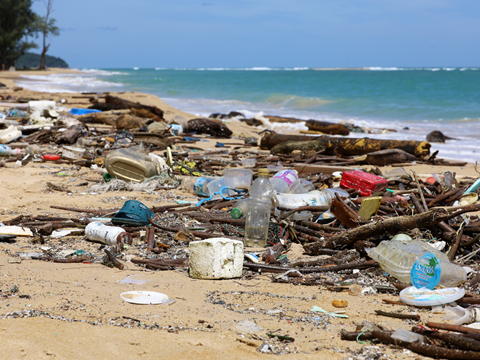
Unilever, Coca-Cola, Nestlé, PepsiCo, and other big names have signed an open letter calling for a ‘robust’ and ‘ambitious’ plastic pollution treaty to be finalized at INC-5.2.
As members of the Business Coalition for a Global Plastics Treaty, over 290 businesses, financial institutions, and NGOs state in the letter that they consider harmonized regulations the “most effective way to pursue a lasting impact on plastic pollution while delivering economic, environmental and social value” at a national and global level.
According to the Coalition, such progress could bolster product recyclability and reusability worldwide, projecting a 77% increase in global recycled content availability by 2040.
Mismanaged waste could decline by 23% globally, the letter asserts, while twice as many ‘problematic’ and avoidable plastic products could be phased out.
They list phase-outs, product design, and extended producer responsibility (EPR) among the measures that, in their eyes, will ensure international consistency while bolstering the efforts of individual nations – and serving as a lower-cost option to tackling plastic pollution.
Reportedly, global cumulative EPR revenues could more than double between 2026 and 2040. Long-term decision-making for businesses could improve as the cost of capital decreases.
The Coalition also emphasizes potential social benefits, including stable jobs across the plastics value chain, especially in the waste management sector; improvements in public services and health among communities; and support for tourism and fishing due to cleaner environments.
With INC-5.2 scheduled to take place in Geneva from 5th – 14th August 2025, the letter’s signatories call for ambition in the upcoming treaty – aligning with The Nice Call for an Ambitious Treaty on Plastic Pollution, as agreed at the United Nations Oceans Conference in Nice, France.
“For businesses, it’s crucial to leave Geneva with, at the very least, a starting treaty that can be built upon in the future,” asserted Dr. Fisk Johnson, chairman and CEO of SC Johnson.
“The treaty should pave the way for countries to introduce well-designed Extended Producer Responsibility (EPR) programmes and establish common packaging design criteria, including the elimination of hard-to-recycle plastics. Global design rules are essential for economies of scale in cost and in driving scale in circular innovation.
“Additionally, the treaty should provide a funding mechanism to help countries in the global south improve basic waste collection. In addition, EPR can significantly increase recycling rates for plastics and promote refill and reuse systems.
“Achieving our desired circularity outcomes will require businesses, governments, and individuals to move in the same direction. A signed, implementable global treaty is a critical step forward.”
TOMRA continued: “The benefits of harmonized, global compared to fragmented regulation are manyfold and include reduced net public waste management costs, increased policy predictability, significantly improved system services like collection and recycling, increased employment opportunities, and significant reductions in mismanaged waste and problematic single-use plastics.
“India, in particular, is projected to benefit from a 73% increase in economic growth and a 57% increase in jobs across the value chain, a 29% decrease in mismanaged waste, 30% decrease in net public waste management cost, as well as increases in recycling rates, availability of recycled content and reductions in plastic waste and problematic single use plastics.
“TOMRA believes strongly that India will benefit from a Global Plastics Treaty and support the implementation of mandatory and harmonized regulation ahead of INC 5.2.”
“We have high expectations for the early establishment of a global plastics treaty to set harmonized rules,” said Hiroshi Fujikawa, senior executive officer at Kirin Holdings Company. “Varied national regulations increase corporate burden and hinder recycling efficiency.
“Without common design rules, recycling quality and supply suffer. International frameworks enable consistent business practices, strengthen environmental efforts, and support fair competition. This treaty will empower countries like Japan to lead globally in sustainable plastic material circulation.”
Gandha Wiraraharja, president director at Amcor Flexible Packaging Solutions Indonesia, commented: “Indonesia is taking meaningful steps to address plastic pollution, and businesses are ready to support this transition. A global treaty with harmonised product design rules would accelerate progress. Support for implementing packaging EPR systems would further enable scalable, circular solutions across the country.”
“Only a robust treaty with harmonised regulations and common obligations will deliver a lasting impact on the plastic pollution while delivering economic, environmental and social value in Brazil,” added Andrés González, head of Unilever Brazil.
After the last round of INC negotiations in South Korea, the French government shared a statement of ambition supported by 95 countries; we delved deeper into its call for all INC members to agree on an ‘ambitious, universal and effective’ treaty in upcoming talks.
Various other attendees commented on the outcome of INC-5 after its conclusion. Unilever’s senior global sustainability manager, Ed Shepherd, applauded the widespread ambition on show, but expressed his concern about gaps in the current text and the ongoing risk of ‘endless negotiations’.
Eirik Lindebjerg, global plastic policy lead at WWF, also joined us on the Packaging Europe podcast to underline the questions that must be answered during INC-5.2.
If you liked this story, you might also enjoy:
The ultimate guide to the Packaging and Packaging Waste Regulation in 2025
How are the top brands progressing on packaging sustainability?
Everything you need to know about global packaging sustainability regulation in 2025
The key to increasing the use of reusable packaging in supermarkets













No comments yet